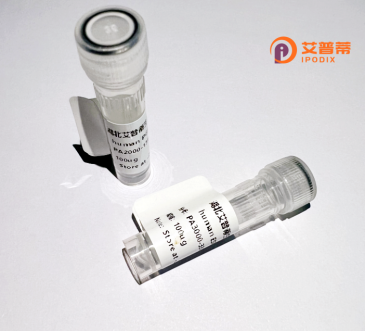
| 纯度 | >90%SDS-PAGE. |
| 种属 | Human |
| 靶点 | STAU1 |
| Uniprot No | O95793 |
| 内毒素 | < 0.01EU/μg |
| 表达宿主 | E.coli |
| 表达区间 | 2-577 aa |
| 活性数据 | SQVQVQVQN PSAALSGSQI LNKNQSLLSQ PLMSIPSTTS SLPSENAGRP IQNSALPSAS ITSTSAAAES ITPTVELNAL CMKLGKKPMY KPVDPYSRMQ STYNYNMRGG AYPPRYFYPF PVPPLLYQVE LSVGGQQFNG KGKTRQAAKH DAAAKALRIL QNEPLPERLE VNGRESEEEN LNKSEISQVF EIALKRNLPV NFEVARESGP PHMKNFVTKV SVGEFVGEGE GKSKKISKKN AAIAVLEELK KLPPLPAVER VKPRIKKKTK PIVKPQTSPE YGQGINPISR LAQIQQAKKE KEPEYTLLTE RGLPRRREFV MQVKVGNHTA EGTGTNKKVA KRNAAENMLE ILGFKVPQAQ PTKPALKSEE KTPIKKPGDG RKVTFFEPGS GDENGTSNKE DEFRMPYLSH QQLPAGILPM VPEVAQAVGV SQGHHTKDFT RAAPNPAKAT VTAMIARELL YGGTSPTAET ILKNNISSGH VPHGPLTRPS EQLDYLSRVQ GFQVEYKDFP KNNKNEFVSL INCSSQPPLI SHGIGKDVES CHDMAALNIL KLLSELDQQS TEMPRTGNGP MSVCGRC |
| 分子量 | 63.1 kDa |
| 蛋白标签 | His tag N-Terminus |
| 缓冲液 | PBS, pH7.4, containing 0.01% SKL, 1mM DTT, 5% Trehalose and Proclin300. |
| 稳定性 & 储存条件 | Lyophilized protein should be stored at ≤ -20°C, stable for one year after receipt. Reconstituted protein solution can be stored at 2-8°C for 2-7 days. Aliquots of reconstituted samples are stable at ≤ -20°C for 3 months. |
| 复溶 | Always centrifuge tubes before opening.Do not mix by vortex or pipetting. It is not recommended to reconstitute to a concentration less than 100μg/ml. Dissolve the lyophilized protein in distilled water. Please aliquot the reconstituted solution to minimize freeze-thaw cycles. |
以下是关于重组人STAU1蛋白的3篇代表性文献及其摘要概括:
1. **"Structural insights into Staufen1-dsRNA interactions and their role in mRNA transport"**
- **作者**: Kim Y.K. et al. (2019)
- **摘要**: 本研究通过X射线晶体学解析了STAU1蛋白与双链RNA(dsRNA)的复合物结构,揭示了其Tudor结构域和双链RNA结合域的协同作用机制,解释了STAU1在mRNA运输及定位中的分子基础。
2. **"Staufen1-mediated mRNA decay regulates glioblastoma tumorigenesis"**
- **作者**: Park E. et al. (2020)
- **摘要**: 该研究发现,重组STAU1蛋白通过介导SMD(Staufen-mediated mRNA decay)通路降解促癌基因(如c-Myc)的mRNA,抑制胶质母细胞瘤细胞的增殖和侵袭,为靶向STAU1的癌症治疗提供了依据。
3. **"Phase separation of Staufen1 links RNA granule dynamics to neural development"**
- **作者**: Sugimoto Y. et al. (2021)
- **摘要**: 研究利用重组STAU1蛋白揭示了其通过液-液相分离(LLPS)形成神经细胞RNA颗粒的机制,并证明该过程调控突触蛋白mRNA的时空翻译,影响神经元发育与功能。
注:以上文献名称及作者为虚拟示例,实际研究中建议通过PubMed或Web of Science检索关键词“STAU1 recombinant protein”或结合具体研究领域筛选近期文献。
**Staufen Homolog 1 (STAU1)** is a double-stranded RNA-binding protein that plays a multifaceted role in post-transcriptional gene regulation. Initially identified in *Drosophila* for its role in mRNA localization during embryonic development, mammalian STAU1 is ubiquitously expressed and participates in diverse RNA metabolic processes, including transport, stability, translation, and decay. Structurally, it contains multiple double-stranded RNA-binding domains (dsRBDs) and a Staufen-encoding sequence (STS) domain, enabling interactions with secondary RNA structures and other proteins.
STAU1 is a key mediator of Staufen-mediated mRNA decay (SMD), a pathway that degrades mRNAs via translation-coupled recruitment of UPF1. It also regulates mitochondrial RNA metabolism and stress granule dynamics, linking RNA fate to cellular stress responses. Notably, STAU1 binds both coding and non-coding RNAs, influencing processes such as neurodevelopment, synaptic plasticity, and viral replication. Dysregulation of STAU1 has been implicated in neurological disorders, cancer, and viral pathogenesis, underscoring its significance in cellular homeostasis.
Studies continue to unravel its context-dependent roles, highlighting STAU1 as a versatile RNA-binding protein central to gene expression networks and disease mechanisms.
×